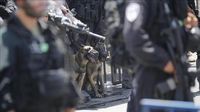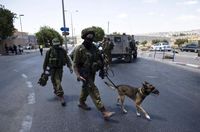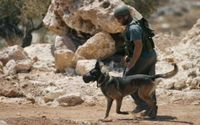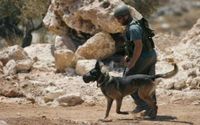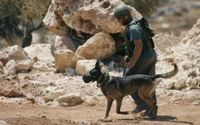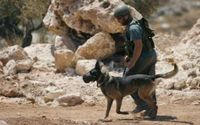The Euro-Mediterranean Human Rights Monitor has raised serious concerns regarding the Netherlands' ongoing export of military dogs to Israel, labeling it as a potential complicity in international crimes. The watchdog organization argues that these dogs are employed by Israeli forces as instruments of torture and intimidation against Palestinians, particularly in the Gaza Strip.
In a statement released on April 11, 2025, the Euro-Med Monitor outlined that the Netherlands has continued to supply military dogs to the Israeli occupation army and its security services, despite the knowledge that these animals are used to inflict harm on Palestinian civilians. The organization has called for an immediate halt to these exports and urged the Dutch parliament to launch a comprehensive investigation into the matter.
According to information from the Center for Research on Multinational Corporations (SOMO), Dutch companies have obtained veterinary certificates to export 110 dogs to Israel between October 2023 and February 2025, with a significant portion of these exports linked to the company Four Winds K9, based in the village of Kheffen in the Netherlands. This company has a long-standing history of supplying military dogs to Israel.
The Euro-Med Monitor's field team has documented numerous instances where Israeli forces have used these dogs to attack civilians, including children, the elderly, and the sick. This systematic use of military dogs has been reported during raids on homes, inspections of facilities, and other operations in the Gaza Strip, contributing to a broader pattern of violence and intimidation against the Palestinian population.
One particularly harrowing incident involved a 60-year-old woman, who recounted being attacked by a military dog in her home in Jabalia on May 14, 2024. "I was sleeping in my house when the Israeli forces entered after an explosion in the wall. Suddenly, a dog attacked me, biting my shoulder and dragging me outside while the soldiers laughed," she described, highlighting the brutality of these encounters.
In light of these revelations, the Euro-Med Monitor has emphasized that the Netherlands bears legal responsibility for its role in supporting the Israeli military's operations against Palestinians. The organization has pointed out that the continued export of military dogs, despite their use in severe human rights violations, constitutes a violation of international law.
Furthermore, the Euro-Med Monitor has called for the establishment of a compensation fund for Palestinian victims affected by the use of military dogs during Israeli military operations. They argue that the Dutch government and companies involved in these exports should take responsibility for the harm caused and provide medical, psychological, and financial support to the victims.
The report from the Euro-Med Monitor aligns with broader international concerns regarding the Netherlands' complicity in Israeli actions in the occupied territories. It raises critical questions about the ethical implications of arms and equipment exports to countries where they might be used to perpetrate human rights abuses.
As the situation in Gaza remains dire, with ongoing military operations leading to significant civilian casualties, the Euro-Med Monitor's findings underscore the urgent need for accountability and a reassessment of international arms trade policies. The organization has urged the Dutch parliament to take immediate action to prevent further complicity in violations of international law.
In recent weeks, the conflict in Gaza has escalated, with reports indicating that the Israeli military has intensified its operations, resulting in numerous casualties among Palestinian civilians. This context adds urgency to the Euro-Med Monitor's calls for a thorough investigation into the Netherlands' role in supplying military dogs to Israel.
As the international community watches closely, the Euro-Med Monitor's findings may prompt a reevaluation of the ethical responsibilities of nations involved in the arms trade, particularly regarding their implications for human rights and international law.
